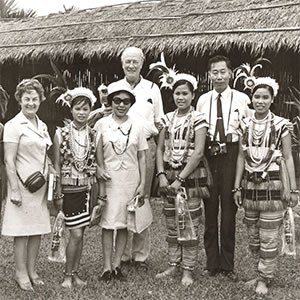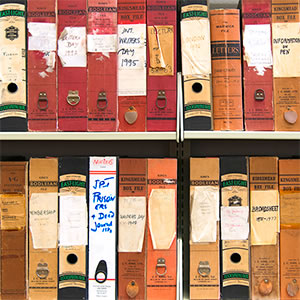PEN Teaching Guides
The PEN Teaching Guides contain materials for the use of instructors to support teaching on human rights, politics, literature, and cultural history. These materials include manuscripts, drafts, clippings, correspondence, official publications, books, posters, video recordings, and additional items from the PEN Digital Collections and related collections held at the Harry Ransom Center.
These guides are designed to allow students to engage not only with evolving conversations surrounding human rights and free speech in the twentieth century, but also with landmark events and broad historical trends, from the rise of fascism in the interwar years, through the intensification of the Cold War, and into the era following the collapse of the Eastern Bloc in the late 1980s and 1990s.
For further information on teaching or scheduling classes in the Harry Ransom Center, visit Classroom Experiences.
International
Human Rights

This guide helps to demonstrate PEN's evolution as an advocacy group and highlights some of the causes PEN took up to protect writers in conflict.
Writers and
Free Speech

This guide tracks PEN's advocacy for freedom of expression, its support for incarcerated writers, and its efforts against censorship.
Writers in Exile /
Global Refugees

Global Refugees
This guide highlights PEN's engagement with displaced authors, playwrights, and intellectuals forced to flee their home nations by the armed conflicts of the twentieth century.
Writing the Cold War

This guide follows PEN's international activity from the 1950s into the Cold War as the conflicts it encountered changed from overt response to war into a complex balance of advocacy and diplomacy.
Writing World War II

This guide places PEN's activities on behalf of writers in historical context and demonstrates how the organization coped with the consequences of World War only two decades after its inception.
Digital Collections

Newsletters, minutes, reports, scrapbooks, and ephemera from the PEN archives.
Produced with support from National Endowment for the Humanities.
These teaching guides were written by Reid Echols and Adrienne Sockwell with help from Jennifer Follen, Sarah Gutberlet, Christopher Mendez, and Chido Muchemwa.
We have attempted to minimize harm or adverse impact by selecting primary sources that we believe will not place people at risk. Please notify us at reference@hrc.utexas.edu if you believe we need to remove any materials from this digital collection.
Takedown Notice: This material is made available for education and research purposes. The Harry Ransom Center does not own the rights for these items; it cannot grant or deny permission to use this material. Copyright law protects unpublished as well as published materials. Rights holders for these materials may be listed in the WATCH file. It is your responsibility to determine the rights status and secure whatever permission may be needed for the use of any item. Due to the nature of archival collections, rights information may be incomplete or out of date. We welcome updates or corrections. Upon request, we'll remove material from public view while we address a rights issue.

